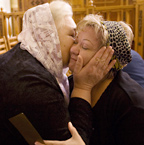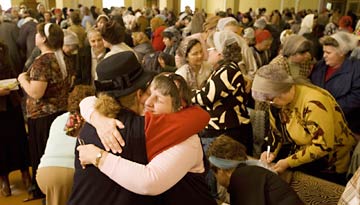Posted: 12/28/06
Explore the Bible Series for January 7
God will guide his people past obstacles
• Nehemiah 4:1-23; 5:1-19; 6:1-19; 7:1-73
By Howard Anderson
Diversified Spiritual Associates, San Antonio
There were six attempts to stop Nehemiah’s work: Sanballat and Tobiah mocked Nehemiah; the enemy threatened a military attack; Sanballat and Geshem attempted to lure Nehemiah outside of Jerusalem to Ono; Sanballat threatened Nehemiah with false charges; Shemaiah, Noadiah and others were paid to prophesy falsely and discredit Nehemiah; and Tobiah had spies in Jerusalem and wrote Nehemiah letters in order to frighten him.
With intimidation and opposition to rebuilding the walls around Jerusalem, Nehemiah sought God’s guidance to devise sound strategies to work around the hindrances.
Trowels and swords (Nehemiah 4:1-23)
Sanballat was burning with rage. He gathered men from the army of Samaria and his local militia, and then mocked the Jewish people with sarcastic questions—“What will these feeble Jews do? Will they fortify themselves? Will they sacrifice? Will they make an end in a day? Will they revive the stones out of the heaps of the rubbish which are burned?”
It is possible his intentions were to provoke the military force to action, since that would have brought the Persian overlord down on Samaria swiftly. Harassment and mockery became the primary strategy to prevent the reconstruction of the walls. Sanballat poured contempt on the Jewish people and on their God. Tobiah, the aide of Sanballat, declared that if a small creature like a fox jumped on the wall, the wall would collapse because of its flimsy construction.
Nehemiah did not respond to his opponents. Instead, he prayed the Lord would not forgive them. Nehemiah believed when the people of God were involved in the work of God, any assault on them was an assault on God.
When the ridicule did not stop the work on the wall, Nehemiah’s opponents tried a threat of attack. The opposition against Nehemiah had started with two people (Nehemiah 2:10) and had grown to three (2:19). Now it had become a multitude that surrounded Jerusalem. Sanballat was a Samaritan from north of Jerusalem. The Arabians were to the south, the Ammonites to the east, and the Ashdolites to the west.
Nehemiah’s spirit had affected the entire group of workers to pray—a group prayer to God. They not only prayed, but they set a watch and did what was humanly possible to protect themselves from attack.
Under the circumstances, some of the workers became discouraged. The wall was half finished (v. 6), but the task was taking its toll. While the Jewish workers became discouraged (v. 10), the opposition intensified. The adversaries began a whispering campaign among the Jewish people to stop the building of the wall.
Because there was no Jewish army, the people had to defend themselves. Nehemiah placed men strategically on the wall. From the high places on the wall, men could see the approaching enemy. Other men defended the low places of the wall.
Nehemiah’s strategy was to address both leaders and laypeople. In this way, all the community would have ownership of the same ideals. Nehemiah said, “Fight for your brethren.” He reminded the Jewish people they were not mercenary soldiers earning a salary or hoping for loot. Not only were their own lives at stake, but so were the lives of their loved ones. God answered Nehemiah’s prayers. The people were inspired by his wise words and returned to their tasks.
Nehemiah armed the workers and divided his own servants into two groups. Half of them worked on the wall and half of them stood guard. Since the builders needed both hands to work, their swords were hung on their sides. He instituted an alarm system for those who worked on the wall. A trumpeter with a ram’s horn stood near Nehemiah wherever he went. If the wall was attacked, the alarm would gather all of the people quickly to the danger spot.
The people worked during the day and stood guard at night. Workers living out of town were asked to remain in the city rather than return home. Except for washing, Nehemiah and his men never took off their clothes. They worked day and night.
Injustice and oppression (Nehemiah 5:1-19)
The prolonged period of working, watching, fear and weariness inevitably led to trouble among the people in Jerusalem. The first group of complainers had large families, and did not have enough food to eat. The second group of complainers had large mortgages to pay and could not buy food. The third group of complainers had large taxes to pay and had been forced to mortgage their land and even to sell their children.
While hunger, shortages, taxes and money were the immediate results of the people’s circumstances, they were not the heart of the problem. The people’s basic problem is pinpointed in the words “against their brethren the Jews.” The people were not complaining just about poverty and high taxes; they were grumbling about each other.
In verse 1, the “people” refers to the poor; the “brethren” refers to the rich rulers (v. 7). In short, this was a class conflict. The poor people had mortgaged their lands, vineyards and houses. They had borrowed money and even had sold their sons and daughters into slavery.
From the perspective of the Law, there were two problems here: Usury— lending money and charging interest; and slavery. It was not wrong for a Jewish person to lend money with interest to a non-Jewish person (Deuteronomy 23:19-20), nor was it wrong for a Jewish person to lend money to a fellow Jew; however, the law did prohibit usury (Exodus 22:25). Interest rates were exorbitant and could easily lead a person into poverty and enslavement. This leads to the second problem. According to the law of Moses, a Jewish person could hire himself out to someone, but not as a slave (Leviticus 25:35-40).
Nehemiah’s first response to the sins of the Jewish people was anger. Deliberate disobedience of the word of God ought to make a person indignant toward the sin—but not toward the sinner. After getting angry at the sins of the Jewish people (v. 6), Nehemiah spent time in serious thought. After rebuking the guilty parties privately, he confronted them in public with the same charges. When Israel, a nation called by the Lord, stopped honoring and obeying him, it became a scandal because God’s name was being dishonored.
Nehemiah challenged the lenders to restore what they had taken with interest. He shook his lap garment as if he were getting rid of what he was carrying. Nehemiah dramatized what God would do if the people broke their promise. God would shake them loose from their houses and their possessions. Nehemiah’s motives were pure. He was not doing good for the praise of men, but to please God.
Deceit and intimidation (Nehemiah 6:1-19)
Nehemiah’s enemies, realizing that open opposition had not worked and that the wall was close to being finished, suggested a conference. Somehow, perhaps by a word from the Lord, Nehemiah was warned of his enemy’s intent.
The evidence used to accuse Nehemiah of rebellion was the assertion that prophets were proclaiming Nehemiah to be king. Nehemiah’s enemies threatened to take the matter to the king of Persia. They used this threat as leverage to force Nehemiah to attend their proposed meeting. Although they had no real intention of going to the king (v. 9), they hoped their threats would ruin Nehemiah’s reputation so the workers would lose their resolve. Nehemiah would not allow himself to get sidetracked. Instead, he committed his enemy’s accusations to the Lord.
Shemaiah, the priest, suggested to Nehemiah that they enter the holy place to be safe from assassins. It was lawful for an Israelite to seek refuge at the altar outside the temple (Exodus 21:13-14), but only a priest could enter the holy place. Nehemiah’s enemies were subtly tempting him. If the could trap him in sin, this would discredit him and the work.
Examples are all around us of powerful ministers falling prey to homosexuality, adultery and drug abuse.
God gave Nehemiah the wisdom to discern the error in Shemaiah’s counsel. Tobiah and Sanballat were the principal instigators behind Shemaiah. Nehemiah indignantly rejected Shemaiah’s counsel for two reasons. A man such as himself should not flee. Nehemiah was the governor, a leader of the people. He was responsible to the king and ultimately to the King of Kings; therefore, a man in his position should not run and hide out of fear.
During the building of the wall, a number of personal letters were exchanged between some of the nobles of Judah and Tobiah. Tobiah and his son Jehohanan had married Jewish women. Some of the nobles sang Tobiah’s praises to Nehemiah and then reported back to Tobiah everything they learned from the governor. With these letters, they hoped either to entrap Nehemiah in his own words or to intimidate him.
Organization and registration (Nehemiah 7:1-73)
The Levites were assistants to the priests (Numbers 18:1-4) and guarded and cleaned the sanctuary. Nehemiah appointed the Levites to their duties in the temple. The porters, gatekeepers and singers were numbered among the Levites. The gatekeepers kept watch over the house of God and opened and closed the gates of the temple court (1 Chronicles 9:17-19; 26:12-19). The singers led the people in their musical worship of God.
Nehemiah appointed two guards over the city as municipal officers in charge of security—each guard responsible for half of Jerusalem (Nehemiah 3:9-12). One of the guards was Nehemiah’s brother, Hanani, who had visited Jerusalem and brought back a bleak report to Nehemiah in Shushan (Nehemiah 1:2).
The other guard was Hananiah. Nehemiah also established guidelines for protecting the city. The gates of a city normally opened at sunrise, but Nehemiah ordered Jerusalem’s gates to be kept closed until the sun was high. This extra precaution would have discouraged enemies from mounting a surprise attack at sunrise. Gates were critical to the defense of an ancient city.
For the size of the city, Jerusalem was under populated. Even though it was 90 years since people had returned under Zerubbabel to live there, there still was much undeveloped space within the walls renewed by Nehemiah.
“And my God put into mine heart” attributes to the Lord the idea of a census that would show the distribution of the population. If Nehemiah knew the population pattern in the capital and the countryside, he could then determine which districts could best afford to lose a portion of their inhabitants to Jerusalem.
Nehemiah discovered a list, recorded by families, of the names of the Jewish people who came from Persia to Judah in 536 B.C. under Zerubbabel. This long list contained the leaders names (v. 7); people by families (vv. 8-25); people by cities (vv. 26-38); priests (vv. 39-42); Levites (vv. 43-45); Nethinim or temple servants (vv. 46-56); Solomon’s servants (vv. 57-60); returnees without a genealogy (vv. 61-65); the total number of people (vv. 66-67); their animals (vv. 68-69); and the gifts given for the support of the work (vv. 70-72).
Discussion questions
• Is God as active today in the lives of his people today as he was in the time of Nehemiah?
• How has God worked in your life to overcome obstacles?
News of religion, faith, missions, Bible study and Christian ministry among Baptist churches, in Texas, the BGCT, the nation and around the world.







